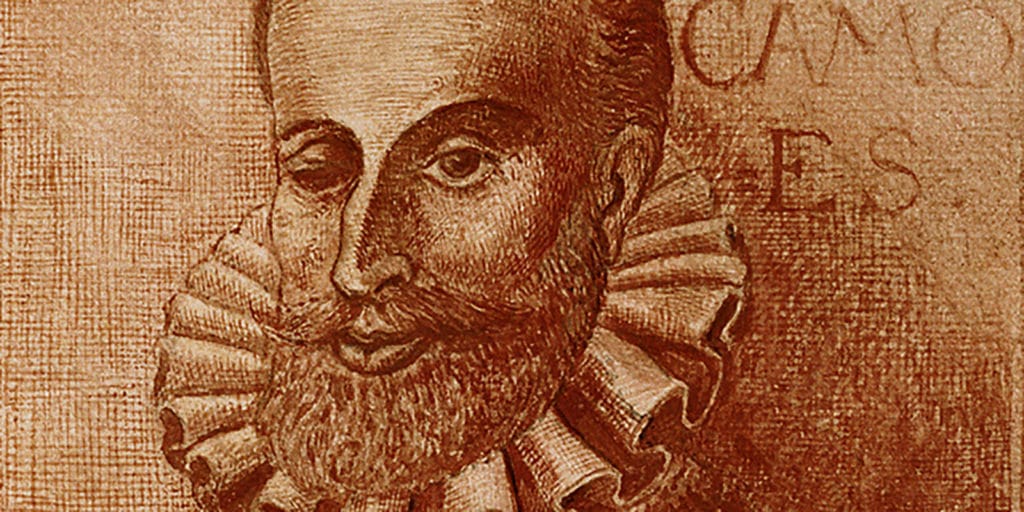Luís Vaz de Camões was a Portuguese adventurer and the great poet in Portuguese.
Luís de Camões wrote Os Lusíadas (The Lusiads)
De Camões (c. 1524 – 1580) traveled all the way from Portugal to China and back. This was in the time when ships were not much bigger than speedboats are today.
De Camões wrote Portugal’s national epic poem Os Lusíadas in 1572. It’s about the opening of the sea route to India by the great Portuguese explorer Vasco de Gama in the 15th century (1497 – 1499).
Canto 1
As armas e os barões assinalados,
Que da ocidental praia Lusitana,
Por mares nunca de antes navegados,
Passaram ainda além da Taprobana,
Em perigos e guerras esforçados,
Mais do que prometia a força humana,
E entre gente remota edificaram
Novo Reino, que tanto sublimaram;
Canto 1
Arms and the Heroes, who from Lisbon’s shore,
Through Seas where sail was never spread before,
Beyond where Ceylon lifts her spicy breast,
And waves her woods above the watery waste,
With prowess more than human forced their way
To the fair kingdoms of the rising day:
What wars they waged, what seas, what dangers past,
What glorious empire crowned their toils at last
This translation was made by William Julius Mickle in 1776.
Vasco de Gama’s journey launched the Portuguese Empire and the European Age of Discovery. De Camões wrote the poem while in exile on the Chinese island of Macau. Portuguese is still spoken there.
Os Lusíadas is often compared to Homer’s Iliad and Odyssey, or Virgil’s Aeneid. That is some serious literature.
Portugal’s national day, Portugal Day, commemorates de Camões’ death on June 10, 1580.
The European Age of Discovery
This was an interesting moment in history. Before the European Age of Discovery, the world was pretty much in balance. There were great civilizations in Europe, Africa, Asia and the Americas. All had a similar level of development. Each was great in its own way.
The fall of Constantinople (Istanbul) to Sultan Mehmed II in 1453 closed the main trade route between Europe and Asia. This led Portuguese sailors and then other Europeans to search for a water route to Asia.
It was also a watershed moment in the technology of war. Sultan Mehmed II used gunpowder to power cannons that destroyed the walls of Constantinople. The cannons were huge. You could fit a person inside them. It meant that walls could no longer provide security. (Why are we still building walls?)
The drive to find a new route to Asia, the well practiced use of gunpowder and the European tradition of endless war, enabled Europeans to colonize Africa, South Asia, West Asia, and the Americas. It has to be said that colonization was ugly. They were military operations with military priests who were collecting souls like Facebook likes and were human slavers. When the colonizers were defeated, they left dysfunctional social, political and economic systems that we still suffer from today.
Only now, over 500 years after the fall of Constantinople, is the world starting to come back into balance. Improvements in technology, communications, logistics (shipping) and finance have redistributed power around the globe.
The globalization of finance out of New York City in the 1970s played a role in this. Wall Street made a lot of money, but also seeded the global competition that we know today.
Americans of the United States may sense a decline in American power, but it is really a rebalancing of the distribution of power across the globe.
Who would be the Luís de Camões of today? They really don’t make them like that any more, but he or she would probably be a rapper or maybe a Fado singer. Anyway, it all began once upon a time in a small country on the sea called Portugal.
Arms and Heroes, who from Lisbon’s shore…

